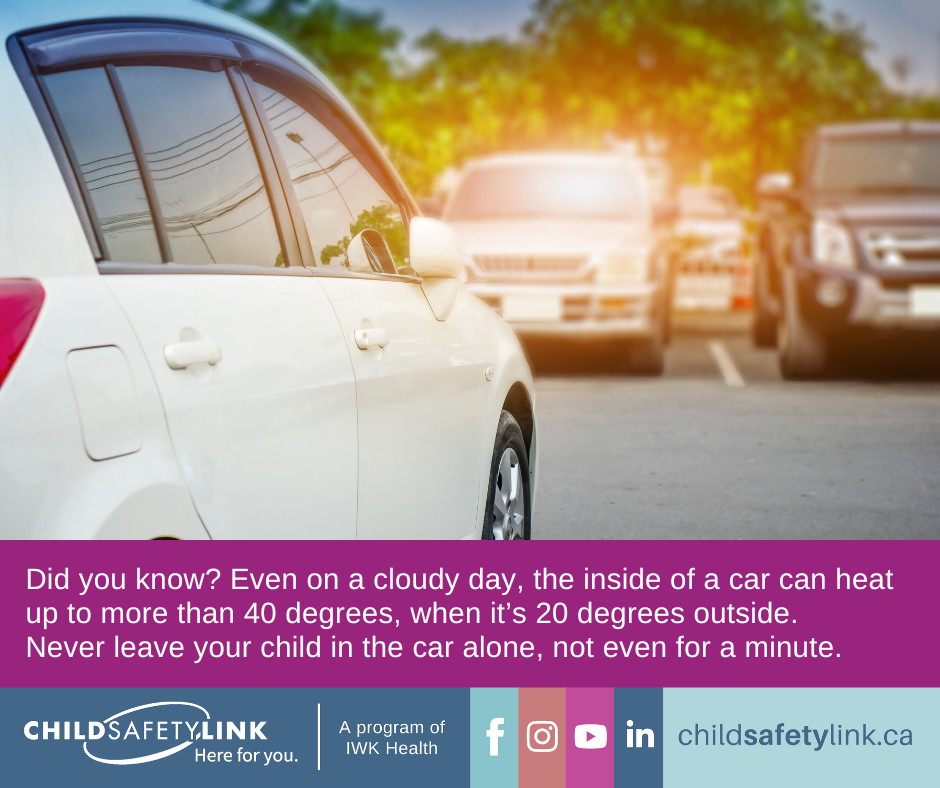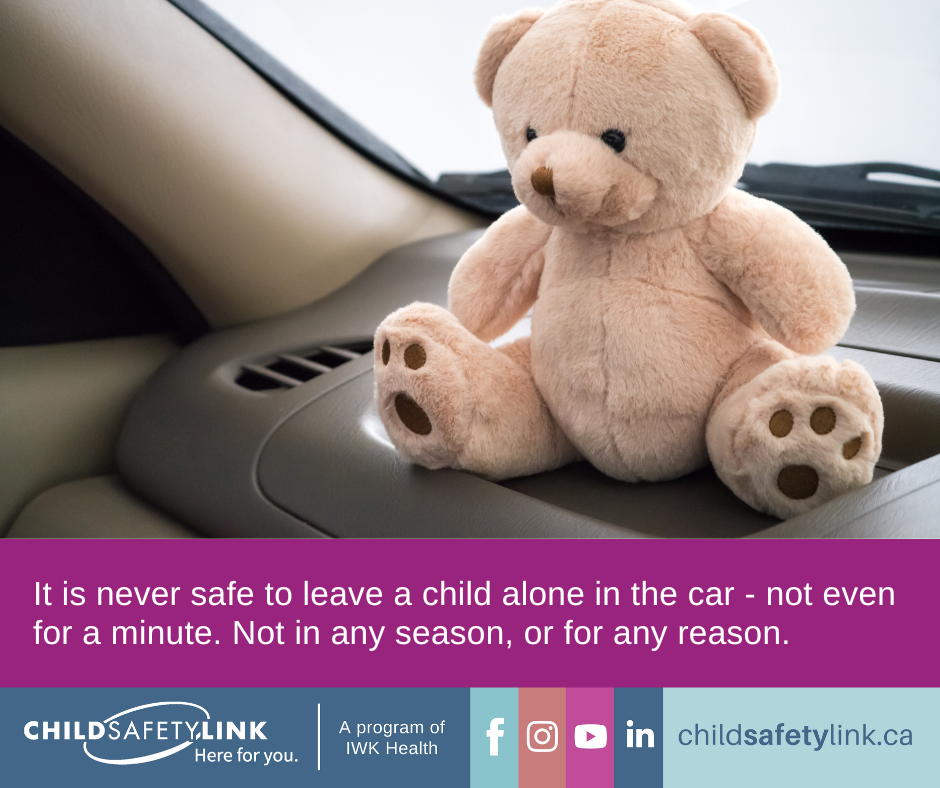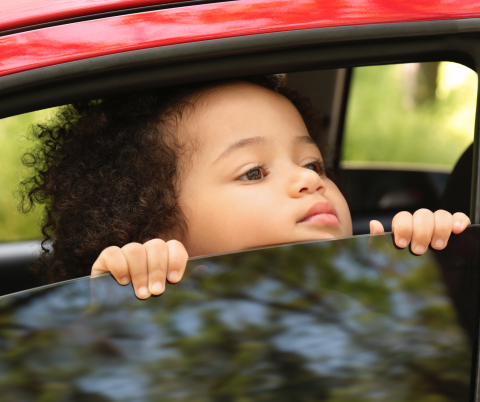Safety Spotlight: Why it’s never safe to leave your child alone in the car… not even “for a minute.”
As busy parents on the go, we’ve all been in one of these scenarios:
- You stop to fill the car with gas, and then realize that you will need to go inside the service station to pay. The kids are in the car, all buckled into their car seats.
- You’re on your way home after picking the kids up at daycare, and you realize you need to run into the store to grab a carton of milk or some other essential item for supper. The kids are tired and buckled into their seats.
- The kids are already buckled in the car in your driveway and you realize you forgot your wallet inside and need to go back inside and search the house.
In each of these scenarios, you might consider how much easier it would be to leave the kids in the car and you might think: “It’s just for a moment, what could possibly happen?” After all, getting in and then out of the car with kids can be a LOT, especially if you have multiple children requiring help with car seats. You may even feel that there is a greater risk of taking multiple children out of the car for a quick errand, however, the data shows that leaving a child unattended in a vehicle – even for a moment - is just not worth the risk.
In the following Q and A, Katherine Hutka, Health Promotion Specialist in Child Passenger Safety with Child Safety Link, explains the risks associated with leaving kids alone in the car:
Q: Why is it so dangerous to leave a child alone in the car, even for a few minutes?
A: Unattended children in cars are at risk in a few ways that you may not have ever considered:
- A child could lock themselves into the car and not be able to open when you ask them to.
- A child can put a car in motion by playing with the gear shift or brakes.
- A child can open the windows or doors and fall out of the car.
- A child can roll up windows on themselves causing suffocation.
- A child could get out of their car seat, leave the car and wander off in unsafe areas (road, parking lot, strange neighbourhoods etc.)
- The vehicle could be stolen with a child inside.
- A child can could experience medical distress requiring immediate help.
- Even on an overcast day, the temperature inside a vehicle can heat up fast, which can quickly lead to heatstroke in a child’s smaller body.
When considered individually, each of these incidents are rare, but when you add them up, there are considerable risks to child being alone in a car.
Q: Is it more dangerous to leave kids in the car in the warmer months?
A: “Hot car deaths” are definitely a risk in warmer months of the year, but it is still dangerous to leave children in spring, fall and even in the colder months. Vehicular heat strokes among children occur because the air inside the vehicles heats up quickly due to a “greenhouse effect” where the sun heats up the inside of the car and this heat is trapped inside.
Consider the following:
- The temperature inside a car can go up to 40 degrees Celsius when the outside temperature is only 22 degrees in less than an hour, even on an overcast day. On a day where the temperature is 26 degrees, it only takes 10 minutes for the inside of the car to heat up to 99 degrees.
- A child’s body smaller body can overheat 3-5 times faster than an adult.
- Although the risk of heatstroke is lower in the winter, there are still risks including carbon monoxide poisoning.
There is no safe way or best time to leave a child alone in a vehicle. Period.

Q: What about when people mistakenly leave their children in the car?
A: There are studies in the US that show that children who are injured in a vehicle are either:
- knowingly left in the car by a caregiver (21%)
- unknowingly left in the car by a caregiver (52%)
- gained access to a car and got in on their own (25%)
Let’s talk about children who are “forgotten” or unknowingly left in a car. No one ever thinks that this could happen to them, but…Have you ever driven somewhere and couldn’t remember the drive? Have you ever felt like you were on “autopilot” during a routine part of your morning or after work?
People who have studied memory tell us that even the most loving and capable parent can lose awareness that a child is still in the vehicle. It’s sometimes called “Forgotten Baby Syndrome” and it’s one of the main reasons why children are injured alone in a vehicle, and it can happen to anyone. It can happen when the caregiver changes their regular route, or destination or when their regular routine is interrupted somehow. Other risk factors include lack of sleep, stress, fatigue, and distractions, which are common for every parent of a young child to experience.
Here’s another fact: Approximately 43% of children who were unknowingly left were thought to have been safely dropped off at childcare.

Q: What can you do to prevent unknowingly leaving your young child in a car?
Creating simple habits can help keep your child safe:
- Never leave your child in a car alone – not even for a moment.
- Place the child’s diaper bag or another essential item in the front passenger seat as a visual cue that the child is still with you.
- Make it a habit of opening the back door every time you leave the car. Choose to leave something you need for your destination in the backseat such as your purse, phone, laptop etc. to force you to open the back door every time you leave the vehicle.
- Does your daycare or school have a “safe arrival” program? Ask your childcare provider to call whenever your child (or any child) does not arrive at the scheduled time.
Q: How can I prevent the risk of a child entering my car without me knowing?
- Always keep your car locked. Ask guests and neighbours to lock their vehicles as well.
- Teach your child that a vehicle is not a place to play.
- Keep car keys and fobs up high, out of a child’s reach.
- If a child is missing, check all vehicles, including the trunk.
In conclusion, it is never safe to leave your child alone in a vehicle – not even for a moment. Together, we can reduce the risks through a few simple habits like never leaving a child alone in a car, placing reminders in the car when transporting your child, and keeping vehicles locked at all times.
